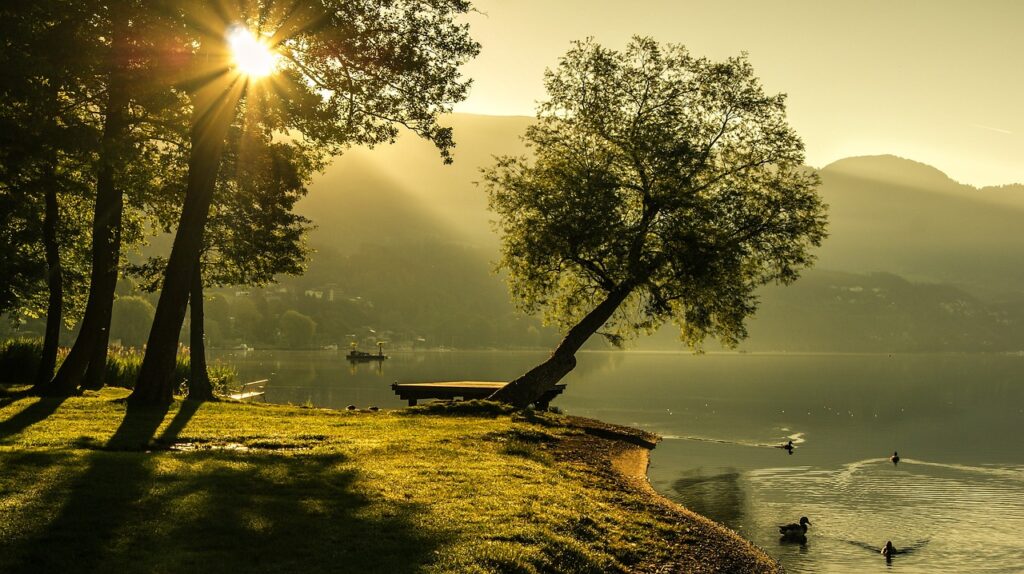New Ways to Engage with Nature and Boost Your Wellbeing
How much time do you spend in nature each week?
Do you know the names of the trees and flowers in your local area?
Would you like to deepen the relationship with nature to boost your wellbeing?
We are nature, and nature is us. Nature offers a sanctuary that modern life often overlooks because it reconnects us with our roots. As this connection deepens, it nurtures and heals your mind, body and soul, igniting energy, health and wellbeing.
This article offers new ways of interacting and engaging with nature, which will add adventure and fun to you and your loved one’s lives.

Prior to engaging in some of these ideas, measure your stress levels and blood pressure. Then do these measures again after several months of regular practice.
In our fast-paced, technology-driven world, finding new ways to engage with nature has become essential for boosting our overall well-being. The benefits of spending time outdoors are well-documented; from reducing stress and anxiety to enhancing mood and improving physical health, nature offers a sanctuary that modern life often overlooks.
Our connection to nature is profound and undeniable, influencing our physical, emotional, and spiritual well-being. Every breath we take is a testament to this intricate relationship; the oxygen we inhale comes from the very trees that grace our landscapes and the carbon dioxide we exhale is sequestered by the trees in return.
Consider how nature impacts our mental health. Studies consistently show that spending time outdoors reduces stress, anxiety, and depression. The sights and sounds of natural environments can rejuvenate us, offering a sense of peace that urban settings often lack. When we immerse ourselves in nature (whether through hiking in the mountains or simply tending to a garden) we engage in an ancient ritual that reconnects us with our roots.
Moreover, our ecosystems are intricately woven together. The health of one species often hinges on the health of another; every organism plays its part in maintaining balance within its environment. This interconnectedness serves as a reminder of the responsibility we hold towards preserving these delicate systems for future generations.
In recognizing how deeply intertwined we are with nature, it becomes clear that nurturing this relationship is not just beneficial—it’s essential for our survival. Embracing sustainable practices and advocating for environmental conservation are vital steps toward ensuring that both humanity and the natural world can thrive together harmoniously.
Many people engage in usual activities of gardening, walking or running in nature, picnicking and so forth. In this blog, I present some other less common activities that will galvanise your journey in harnessing the power of nature. Moreover, it will open other exciting outlets for leisure and socialising, which will ooze energy and joy in your life.
Nature bathing
Find a private spot in nature and sit quietly.
Introduce yourself to this space in whichever way you feel is appropriate. Imagine it greeting you back in return. Be present with what you are noticing – what sounds you can hear and the taste and smell of the air around you.

Listen to your heart and what it is saying to you in that moment. Imagine everything you see around you is seeing you too
Imagine the surroundings are a mirror, so what can you see is reflected back within you?
Sit quietly for several minutes. You may wish to journal or draw an image of whatever emerges for you after this process.
Mindful walks in natural settings
Notice your foot touching the ground as you walk, lift it off for the next step and be aware of your next foot engaging with the ground with each step.
This practice encourages you to immerse yourself in your surroundings as you pay attention to the sounds of rustling leaves, the scent of fresh pine, or the sight of vibrant wildflowers. Such mindfulness not only fosters a deeper connection with nature but also cultivates a sense of peace and grounding.
Make a nature friend
This could be a tree or shrub in your garden, a tree or shrub on your way to work or in your favourite park. Take a few deep breaths and engage with this tree. Notice how it changes with each season. Give it love (and hugs if this feels comfortable) and imagine it returning the love back to you.
This practice does not need to be awkward as a tree is a living being just like you and me, so we are all connected by the same energy.
Community gardening projects
These initiatives not only allow you to reconnect with the earth, but also promote social interaction and collaboration. Engaging in gardening can be therapeutic; it provides physical activity while nurturing mental health through the satisfaction of growing your own food or flowers and developing relationships with your neighbours and community.
Outdoor yoga or open water swimming
These practices encourage relaxation and reflection amidst serene landscapes, helping you recharge both physically and mentally.
Foraging
Foraging is not just a fun outdoor activity; it’s a sustainable way to connect with nature and source food directly from the wild. To truly master the art of foraging, consider these best practices that will enhance your experience and ensure safety.
First and foremost, educate yourself about local edible plants and fungi. Invest in a reliable field guide or join foraging workshops led by experienced experts. This knowledge is crucial as some wild plants can be toxic, and misidentification can have serious consequences.
Always forage in clean areas away from pollution sources like roadsides or industrial sites. This ensures that the food you gather is safe to eat. Additionally, familiarize yourself with ethical foraging practices—only take what you need and leave enough behind for wildlife and future growth.
Timing is also essential when it comes to harvesting wild edibles. Different plants have optimal seasons for gathering; knowing when to forage will maximize both flavor and nutrition.
Lastly, embrace the adventure! Foraging encourages exploration of your local environment while fostering a deeper appreciation for nature’s bounty. So grab your basket, do your research, and embark on an enriching journey into the world of wild foods!
What can you do at home?
Increase biodiversity in your garden
Increasing biodiversity in your garden is not just beneficial for the environment; it can also enhance the beauty and productivity of your outdoor space. Here are several effective ways to achieve this:
- Plant Native Species: Incorporate native plants as these are adapted to local climates and soils, providing food and habitat for native wildlife.
- Create Habitats: This could include leaving a patch of wildflowers or creating a small pond, birdhouses, insect hotels, or a log pile to support different forms of life.
- Practice Organic Gardening: Avoid synthetic pesticides and fertilizers to encourage insects and promote soil health.
- Incorporate Edible Plants: Mixing ornamental plants with edible ones can increase biodiversity while providing fresh produce for you and your family.
- Build a Fedge: This is a cross between a fence and a hedge built from waste wood and pruning provides nesting sites, food sources, and shelter for wildlife.
By implementing these strategies in your garden, you not only contribute positively to the environment but also create an inviting space teeming with life, making it more vibrant and enjoyable for you and your loved ones!
Final thoughts
Nature provides us with countless resources that sustain not just our physical bodies, but also our mental and emotional well-being. Studies have shown that spending time in natural settings can reduce stress levels and enhance mood, benefits that highlight the importance of maintaining this bond. As urbanization continues to encroach upon natural habitats, it becomes increasingly crucial for us to recognise and nurture this relationship.
By understanding how deeply intertwined we are with nature, we can foster a sense of responsibility towards its preservation. Protecting ecosystems not only safeguards wildlife but also ensures a healthier planet for future generations. Embracing sustainable practices allows us to honour this connection, which runs deeper than mere appreciation; it is an intricate web of interdependence that defines our existence – a harmonious coexistence with the environment that sustains us all.
By exploring these new ways to engage with nature, we can significantly enhance our well-being and foster a more harmonious relationship with the world around us. Embrace these opportunities – they’re not just good for you; they’re vital for your holistic health, as well as that of our beautiful planet!
About me
I feel blessed and fortunate in my life, so I have committed to serving and helping people make positive changes in their lives to help make this world a better place for everyone.
The work that I do, whether it is working 1-2-1 with a client or training a large corporate group or writing books and blogs, is geared towards making a difference and helping people to enjoy joyous, meaningful, happy lives.
All of my books are available to buy HERE
Please share this blog with your friends and family, so that together we can spread the message of personal and planetary wellbeing, which is the greatest gift that we can bestow on others.

www.hansapankhania.com
www.aumconsultancy.co.uk for Wellbeing Services.www.hansapankhania.com for self-help books.

